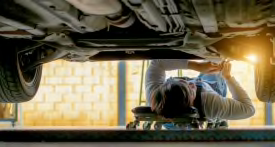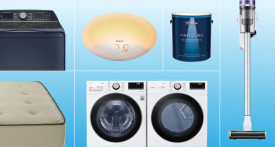Hyundai Recalls Cars for Fire Risk After Improper Repairs
Yet another fire-related recall for Hyundai marks the second time that 2017 and 2018 Ioniq hybrids and plug-in hybrids have been recalled for this problem

Hyundai is recalling over 10,000 2017 and 2018 Ioniq hybrid and plug-in hybrid vehicles (PHEVs) for the second time because dealers may not have properly fixed a hybrid powertrain component that could catch fire. It’s the latest in a series of fire-related recalls from Hyundai.
Hyundai recalled these specific vehicles for the first time in October 2018, but four vehicles caught fire after dealers said they had completed the recall repairs. After further investigation, Hyundai found that some dealers had not done the recall repair properly and that faulty parts had not been replaced, according to documents the automaker provided to the National Highway Traffic Safety Administration (NHTSA).
A spokesperson for the automaker told CR that some dealers billed Hyundai for recall repairs without actually performing the work.
“Hyundai is reviewing and working with the dealer body to ensure proper recall campaign completion,” Ira Gabriel, Hyundai’s senior group manager for corporate and marketing PR, wrote in an email in response to CR’s questions. “Hyundai is taking additional measures regarding recall campaign training/education and verification of recall remedy application.”
So far, Hyundai says that it’s aware of four repaired vehicles that have caught fire and that there have been no reports of crashes or injuries. If the faulty component overheats, drivers may first notice that they’re unable to start the vehicle or that the HEV warning light is illuminated on the dashboard.
Other Hyundai and Kia Fires
Both Hyundai and Kia have issued multiple recalls in recent years that involve more than 3.5 million vehicles that may be at risk of catching fire for various reasons. The Hyundai Motor Company is the largest shareholder in Kia Motors, with a 33.88 percent ownership.
Previous recalls related to fire risks in Hyundai and Kia vehicles involved brake fluid leaks, faulty oil pans, fuel leaks, oil leaks, ABS sensor issues, and hydraulic control unit problems. In 2020, NHTSA announced civil penalties totaling $210 million for Hyundai and Kia after the agency determined that the automakers didn’t conduct earlier recalls in a timely manner.
The Details
Vehicles recalled: 10,575 Hyundai Ioniq Hybrid hatchbacks manufactured between Nov. 16, 2017, and Aug. 16, 2017, and Hyundai Ioniq Plug-in Hybrid hatchbacks manufactured between Aug. 10, 2017, and Aug. 11, 2017.
The problem: Due to a manufacturing error, an electrical contact located below the rear seat may overheat and cause a fire. These electrical contacts should have been inspected and, if necessary, replaced during a prior recall campaign (NHTSA 18V704 or Hyundai 178), but four repaired vehicles caught fire. During an investigation, Hyundai found that the faulty components had not been replaced on these vehicles, despite repair histories indicating that recall repairs had been done.
The fix: Hyundai dealerships will inspect and replace the faulty part, known as the power relay assembly, or PRA, as necessary, free of charge.
How to contact the manufacturer: Owners may call Hyundai at 855-371-9460. The company will mail notification letters to owners in late August.
NHTSA campaign number: 22V459. Hyundai’s own number for this recall is 232. This recall replaces NHTSA recall number 18V704 (Hyundai 178). Vehicles already repaired under the previous recall need to have the new remedy completed.
Check to see whether your vehicle has an open recall: NHTSA’s website will tell you whether your vehicle has any open recalls that need to be addressed.
If you plug your car’s 17-digit vehicle identification number (VIN) into NHTSA’s website and a recall doesn’t appear, it means your vehicle doesn’t currently have one. Because automakers issue recalls often, and for many older vehicles, we recommend checking back regularly.
Stay informed about recalls that might affect your vehicle by using our Car Recall Tracker.
Create a free account now to become a CR member.
















